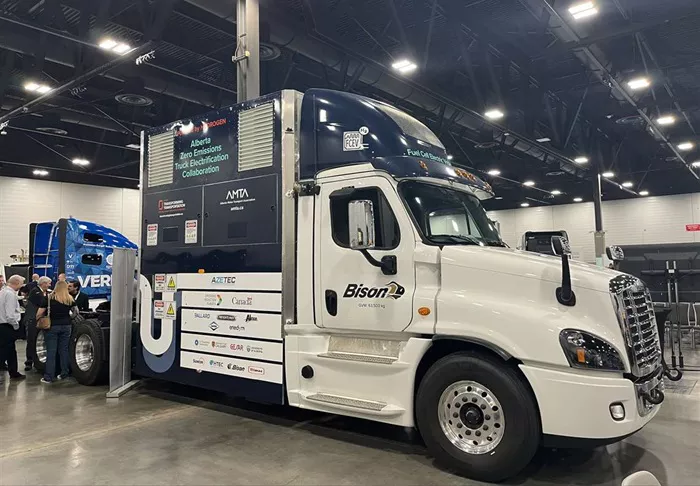In a significant step towards transforming the on-highway trucking sector in Canada, the Alberta Motor Transport Association (AMTA) has spotlighted the pivotal role hydrogen fuel can play in the energy transition. During the inaugural AMTA Industry Innovations Expo held in September, the organization proudly launched the Alberta Zero Emissions Truck Electrification Collaboration (AZETEC) Class 8 truck, underscoring its commitment to hydrogen fuel cell electric vehicles (FCEVs).
“This CA$22 million initiative, bolstered by CA$7.3 million in initial funding from Emissions Reduction Alberta, represents a collaborative effort involving 15 diverse partners across the energy, technology, and transportation sectors,” stated Tim Bennett, board chair of AMTA, in his opening remarks at the expo.
Canadian Payload Advantages
The AZETEC truck not only features a hydrogen-fueled power system but also boasts a distinctive payload capability. Bennett highlighted that the AZETEC truck is pioneering as the first heavy-duty hydrogen fuel cell vehicle globally engineered to accommodate Canadian weight specifications.
“The AZETEC truck breaks ground as the first heavy-duty hydrogen fuel cell vehicle globally designed to support Canadian weights,” he remarked. “Current fuel cell vehicles manufactured to U.S. standards often force Canadian fleets to reduce their payloads by as much as 41 percent. The AZETEC trucks effectively resolve this issue, enabling full capacity freight transport at Canadian weights while being specifically designed to tackle winter conditions and long-haul challenges.”
Addressing Weight Ratings
David Layzell, a professor at the University of Calgary and director of its Canadian Energy Systems Analysis Research (CESAR) initiative, noted that battery electric (BE) trucks usually have a higher gross vehicle weight rating (GVWR) compared to FCEVs. However, the AZETEC truck is poised to change that paradigm.
“This is what sets the AZETEC truck apart,” Layzell explained. “The AZETEC truck has a gross vehicle weight of approximately 63.5 tons, which is crucial for meeting Alberta’s transportation needs and those of Canada as a whole. These vehicles can travel hundreds of kilometers between refuels.”
FCEVs as a Solution
Layzell pointed out that diesel-fueled Class 8 trucks are responsible for 5 percent of Canada’s greenhouse gas (GHG) emissions and 19 percent of the nation’s total transportation emissions. Addressing these emissions necessitates credible and compelling alternatives, he said.
“Hydrogen fuel cell electric vehicles hold the potential to meet this challenge, especially in a province like Alberta and in a country like Canada,” Layzell asserted.
He cited several advantages that support the viability of FCEVs, including Canadian fuel cell production and hydrogen generation from natural gas and electrolysis. Layzell emphasized a strong case for FCEVs as substitutes for diesel-powered vehicles.
“Fuel cell electric vehicles are more efficient than internal combustion engines in converting fuel into vehicle motion,” he explained. “In a mature hydrogen economy, it should be feasible to achieve zero-emission freight transportation at a cost comparable to or even lower than today’s freight transportation expenses.”
The unveiling of the AZETEC truck represents a crucial milestone in the journey towards sustainable transportation, positioning hydrogen fuel cell technology at the forefront of the trucking industry’s evolution.
Related topics:
- $7 Billion Hydrogen Investment to Propel U.S. Decarbonization Efforts
- Japan’s Nanko Power Plant to Boost Efficiency with GE Vernova Turbines in Major Upgrade
- DOE Selects Six Companies to Advance HALEU Fuel Services for Next-Gen Nuclear Reactors

